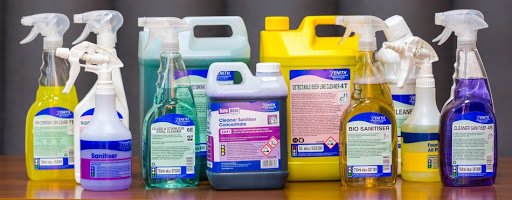Back to: HOME ECONOMICS JSS1
Welcome to class!
In today’s class, we will be talking about the production of cleaning agents. Enjoy the class!
Production of Cleaning Agents

Cleaning agents or hard-surface cleaners are substances (usually liquids, powders, sprays, or granules) used to remove dirt, including dust, stains, bad smells, and clutter on surfaces. Purposes of cleaning agents include health, beauty, removing offensive odour, and avoiding the spread of dirt and contaminants to oneself and others. Some cleaning agents can kill bacteria (e.g. door handle bacteria, as well as bacteria on worktops and other metallic surfaces) and clean at the same time. Others, called degreasers, contain organic solvents to help dissolve oils and fats.
There are four main types of cleaning agents used in commercial kitchens:
- Detergents
- degreaser
- Abrasives
- Acids
Production of cleaning agents
Baking soda:
Baking Soda works as a mild abrasive, helping to gently scrub things that need to be scrubbed. The benefit of scrubbing with baking soda is that it won’t scratch and damage most delicate surfaces. Baking soda also works well to remove smelly odours, making it a prime candidate for a bathroom and kitchen cleaner. Baking soda is a great stain remover and can be used to help soften loads of laundry. Because baking soda is great in so many areas, many cleaning supply recipes will call for it.
Castile soap:
Castile soap is an oil-based soap, that can be used to clean almost anything in your home. Diluted liquid castile soap can be used as an all-purpose cleaner. Liquid castile soap is an excellent degreaser.
Corn-starch:
It can be used as a starching solution for clothing. Corn-starch also absorbs oils and greases, making it a great help in the laundry room or for stains on counter-tops.
Essential oils:
Essential Oils help add a pleasing scent to homemade cleaning solutions. Be careful when using essential oils. A little goes a long way. There are people with high sensitivities to essential oil fragrances.
Lemons and Lemon juice:
Lemons can be great for scrubbing copper bottom pots. The juice works to clean and shine the pans. Lemon juice is a natural bleach, especially when combined with the sun. Lemon juice is a natural degreaser, which comes in handy with dishes.
Salt:
Salt is an abrasive solution for scrubbing. Use salt to get rid of rust and mildew. Salt also works to help polish copper and silver.
Toothpaste:
It works as a very mild abrasive, similar to soft scrubbing gel solutions. Toothpaste can be used to clean silver. It can also be used to remove stains on white clothing, tennis shoes, and in many other places where a light scrubbing is needed.
Vinegar:
It can be used as a fabric softener in the rinse cycle of your washing machine. Vinegar makes a great all-purpose cleaner. Mopping with vinegar is an inexpensive way to keep your floors clean. Vinegar is a great stain remover. Vinegar carefully combined with baking soda makes a great foaming toilet cleaner.
Hydrogen peroxide:
Hydrogen peroxide can be used as a disinfectant. It also is one of the most effective blood stain removers.
With all of these ingredients, be careful about mixing cleaners. Use new clean bottles. Follow storage guidelines for cleaners. Rinse thoroughly, and always follow instructions.
In our next class, we will be talking about the Production of Cosmetic and Deodorants. We hope you enjoyed the class.
Should you have any further question, feel free to ask in the comment section below and trust us to respond as soon as possible.

Very impressive and good .I am amazed.